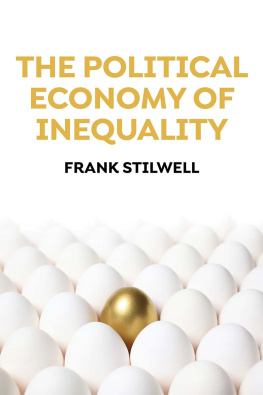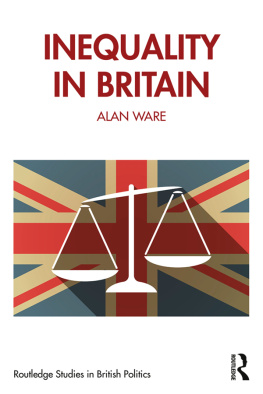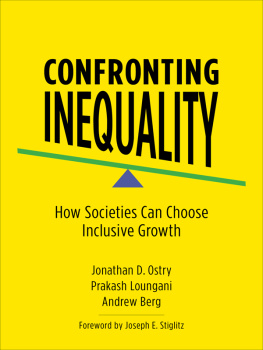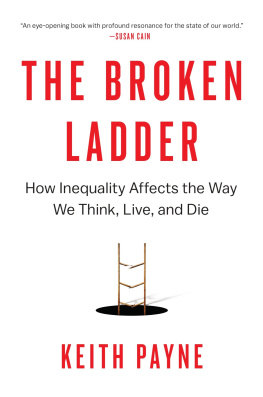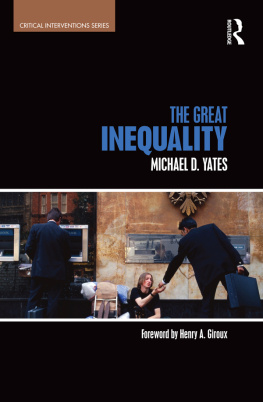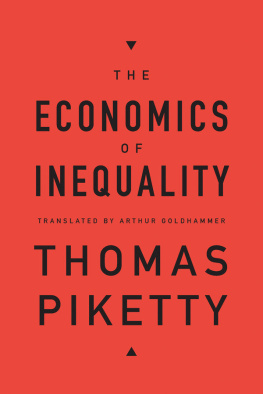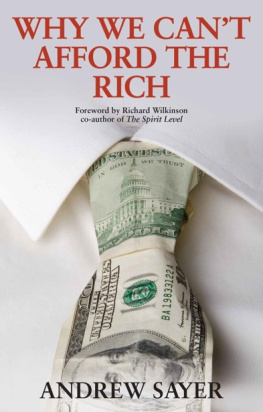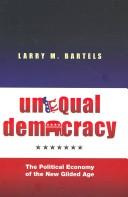
The Political Economy of Inequality
Frank Stilwell
polity
Copyright Frank Stilwell 2019
The right of Frank Stilwell to be identified as Author of this Work has been asserted in accordance with the UK Copyright, Designs and Patents Act 1988.
First published in 2019 by Polity Press
Polity Press
65 Bridge Street
Cambridge CB2 1UR, UK
Polity Press
101 Station Landing
Suite 300
Medford, MA 02155, USA
All rights reserved. Except for the quotation of short passages for the purpose of criticism and review, no part of this publication may be reproduced, stored in a retrieval system or transmitted, in any form or by any means, electronic, mechanical, photocopying, recording or otherwise, without the prior permission of the publisher.
ISBN-13: 978-1-5095-2868-4
A catalogue record for this book is available from the British Library.
Library of Congress Cataloging-in-Publication Data
Names: Stilwell, Frank J. B., author.
Title: The political economy of inequality / Frank Stilwell.
Description: Cambridge, UK ; Medford, MA : Polity, 2019. | Includes bibliographical references and index.
Identifiers: LCCN 2018041109 (print) | LCCN 2019003438 (ebook) | ISBN 9781509528684 (Epub) | ISBN 9781509528646 | ISBN 9781509528646(hardback) | ISBN 9781509528653(paperback)
Subjects: LCSH: Income distribution. | Equality.
Classification: LCC HC79.I5 (ebook) | LCC HC79.I5 S774 2019 (print) | DDC 339.2--dc23
LC record available at https://lccn.loc.gov/2018041109
The publisher has used its best endeavours to ensure that the URLs for external websites referred to in this book are correct and active at the time of going to press. However, the publisher has no responsibility for the websites and can make no guarantee that a site will remain live or that the content is or will remain appropriate.
Every effort has been made to trace all copyright holders, but if any have been overlooked the publisher will be pleased to include any necessary credits in any subsequent reprint or edition.
For further information on Polity, visit our website: politybooks.com
Abbreviations
AIartificial intelligenceAPCAnti-Poverty ConsensusAPCCAnti-Poverty Counter-ConsensusBIbasic incomeBRICSBrazil, Russia, India, China and South AfricaCEOschief executive officersFIREfinance, insurance and real estateGDPgross domestic productGPIgenuine progress indicatorHDIHuman Development IndexIAHDIinequality-adjusted Human Development IndexIMFInternational Monetary FundJINKSJapan, India, Nigeria, the Republic of Korea and Saudi ArabiaMDGsMillennium Development GoalsNGOnon-governmental organizationOECDOrganization for Economic Cooperation and DevelopmentPPPpurchasing power paritySDGsSustainable Development GoalsUNUnited Nations
Preface
Economic inequality is a worldwide concern. During the last few decades, the gap between the incomes, wealth and living standards of rich and poor people has increased in most countries. Prominent public figures, including the Pope, the managing director of the International Monetary Fund and numerous heads of state, have described current levels of inequality as unacceptable. Whether and how public policies should seek to narrow the gap between rich and poor remains controversial, however, and governments are often unwilling to accept the challenge in practice. Vested interests are at stake. There are also widely differing views about the causes, consequences and ethics of inequality. It is pertinent to ask what role the economics profession could and should play in these circumstances. Can it contribute to progress by improving public knowledge about key aspects of inequality, its causes and consequences? I think this would require a broader perspective than most mainstream economists evidently countenance. As a political economist, I have written this book to show a more effective way forward.
The book considers the patterns of inequality, the processes that cause it, the problems that result and the public policies that could reform it, given the political will to act. It is a work of committed scholarship, setting out to coolly consider the issues, the evidence and the competing currents of analysis that offer potentially progressive solutions. The style is transdisciplinary, looking at economic, social, political and environmental issues relating to inequality. These characteristics should make the book relevant to many fields of study, not only economics and political economy, but also sociology, political science, development studies, history and economic geography. Concurrently, the book seeks to engage the interest of non-academic readers. My personal contacts with people engaged in political parties, trade unions, NGOs and social movements lead me to think that there is a strong thirst out there for a clear and reasonably concise book on this subject.
There are already many other books on this topic. Since the onset of the global financial crisis over a decade ago, an impressive array of publications has included Thomas Pikettys blockbuster Capital in the Twenty-first Century (2014) and useful contributions by James Galbraith, Joseph Stiglitz, Branko Milanovic, Danny Dorling and the late Tony Atkinson, among others. The World Inequality Report, first published in 2017, has given a boost to the public dissemination of relevant data on trends in inequality of incomes and wealth. What follows here draws on these and many other contributions, seeking a synthesis, developing the analysis and sharpening its implications. It considers key concepts in political economic analysis, examines the most up-to-date information, applies insights drawn from across the social sciences and explores the implications for policies and politics. I hope that this breadth of coverage, combined with clarity of exposition, will give the book wide appeal and interest.
All scholarly work has a collective character. Personally, I have been fortunate to be at the University of Sydney for most of my academic career, working in the School of Social and Political Sciences with colleagues in a Department of Political Economy who seek to make critically constructive contributions to knowledge, education and social change. Challenging economic orthodoxy and developing progressive alternatives are central to this collective enterprise. Scholarly work has a cumulative character too, reflected here in how the book builds on my previous books and articles on the topic over more than four decades, on new ideas and on the latest information from diverse sources. Making the coverage global has been the hardest challenge this time. Due attention cannot be given to every country and the focus is somewhat biased towards the English-speaking nations, reflecting the most likely locations of readers. However, I have tried to ensure that the data, analysis and examples reflect contemporary developments worldwide.
Some people deserve special thanks. David Primrose worked on this book as my research assistant, offering many useful suggestions as well as carefully preparing the statistical tables and figures. Franklin Obeng-Odoom provided feedback on an earlier draft and encouraged me to embrace southern and post-colonial perspectives alongside the other elements of political economy that shape the books approach. Chris Sheil, my colleague at the Evatt Foundation in Australia, deserves my appreciation for his comments on an earlier draft and for his commitment to get the best data on distributional inequality. Ben Spies-Butcher, Jim Stanford and Phil Griffiths referred me to useful information. Thanks are also due to George Owers, assisted by Julia Davies, from Polity Press, who enthusiastically drove the publishing project and arranged for four anonymous referees to provide helpful feedback on the original proposal. Rachel Moore made the production arrangements for Polity. Justin Dyer did a great job of copy-editing. Neale Towart carefully prepared the index. Finally, my partner Ann Grealis has been, as ever, a marvellous supporter of my efforts.
Next page
